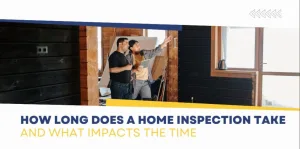How Long Does a Home Inspection Take and What Impacts the Time

How long does a home inspection take, and why does it matter when buying a house? Time is critical in real estate deals, especially for tight closing dates. Knowing what to expect helps you plan better and avoid delays that could cost you money or even your home.
Meanwhile, every inspection is different. Some take just a few hours, while others can stretch much longer. The size of the home, its features, the inspector’s tools, and even the weather all play a part. Understanding these details could make or break your deal, so let’s break them down.
Typical Duration of Home Inspection
A typical home inspection in Philly generally takes around 2 to 4 hours. During this time, inspectors follow a checklist to examine major parts of the home, such as the roof, plumbing, electrical, HVAC system, and foundation. The size and condition of the house can also affect how long it takes.
Additionally, inspectors take time to carefully test, observe, and record any issues. This thorough process helps buyers understand the home’s condition before closing. Even though it takes a few hours, it’s time well spent to avoid costly repairs later. Therefore, plan and allow enough time for it.
Property Size and Features Affect Inspection Time
The dimensions and configuration of a home greatly affect the length of time required for a home inspection. As the property’s features become more complex, the time needed for a thorough evaluation naturally increases.
The following factors impact inspection time:
- Square footage: Larger homes require more time; a small condo may take 90 minutes, while a multi-level 4,000-square-foot house could take hours.
- Additional spaces: Areas like basements, attics, and outbuildings add steps to the process.
- Multi-family layouts: More units mean more systems to inspect.
- Special features: Seams, spas, or crawlspaces require dedicated inspection time.
- Older systems: Dated electrical or plumbing systems may need closer examination, further extending the timeline.
The Role of Inspector Experience and Tools
An inspector’s experience and equipment can significantly influence the length of a home inspection. Seasoned professionals often work more efficiently, while newer inspectors may take more time to ensure they address every detail.
Consider the following differences based on inspector experience and tools:
- Experience level: Veteran inspectors tend to complete inspections faster due to familiarity with common issues and streamlined workflows.
- Advanced tools: Equipment like drones for roofs or thermal cameras for insulation helps speed up assessments and improve accuracy.
- Thoroughness of new inspectors: Less experienced inspectors may take longer as they carefully verify each system and structure.
- Balance of speed and detail: Although slower, newer inspectors often provide very detailed reports, which can be valuable for buyers wanting in-depth insights.
Weather and Accessibility Factors
Weather conditions and accessibility issues can cause unexpected delays during a home inspection. As a result, assessing specific areas of the property or revisiting them for further review may require additional time.
The following factors may delay a home inspection:
- Adverse weather: Rain, snow, or poor lighting can limit visibility and make it unsafe to inspect roofs or exteriors.
- Slippery conditions: Wet or icy surfaces may force inspectors to pause or reschedule outdoor evaluations.
- Blocked attic access: Sealed or jammed doors prevent inspectors from completing full assessments.
- Cluttered crawlspaces: Blocked or debris-filled access points can delay or prevent inspections.
- Locked utility areas: Inaccessible electrical panels or HVAC units can halt progress until someone opens the area.
Additional Services That Extend the Process
Many homebuyers opt for add-on inspections, which extend the timeline but provide deeper insights. Services like:
- Radon testing
- Mold evaluations
- Sewer scope inspections
- Termite inspections
Each of these can add anywhere from 30 minutes to several days (in the case of tests that need lab analysis). Still, they’re often worth it, especially for older homes or properties in high-risk areas.
Plan for a Thorough Inspection!
While most home inspections take just a few hours, many factors can shorten or extend the process. Property size, extra features, weather, and the inspector’s tools play a role. Optional services like radon or mold testing also add time but offer peace of mind.
Consequently, instead of rushing through it, give your inspection the time it deserves. A detailed report can help you avoid big problems later. So, are you ready to make the most brilliant move in your home-buying journey? Schedule your inspection with a certified pro today, and confidently protect your investment.
